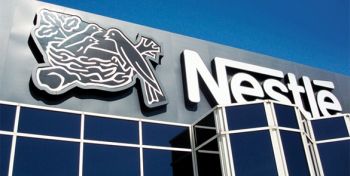Jalisco, Mexico - Nestlé has opened its most water efficient factory in the world in Mexico, in a move that the company plans to replicate in other Nestlé factories globally.
Through new processes that deliver significant efficiencies, Nestlé’s "Cero Agua" dairy factory in the central, water-stressed state of Jalisco will move towards being a zero-water factory. It will use mostly recycled water from its dairy operations.
"Fragile Resource"
The water resource savings are equivalent to the volume needed per day to fill an Olympic-size swimming pool, or enough water to meet the average daily consumption of 6,400 people in Mexico.
Over the past 60 years, the amount of water available for each person in Mexico has declined drastically due to population growth. Saving groundwater is therefore important for the continued wellbeing of local populations.
"In Mexico, and around the world, water is a vital and fragile resource," said Nestlé CEO Paul Bulcke. "Due to the relevance of water in the production of food and its role in the preservation of life, Nestlé worldwide will continue to pursue initiatives that contribute to the maintenance and access to natural resources."
 |
Reusing Water
The Cero Agua dairy factory takes fresh cow’s milk, normally around 88 percent water, and heats it at low pressure to remove some of its water content. The resulting steam is then condensed and treated and then is used to clean the evaporating machines themselves.
Once the machines have been flushed out, the water is then collected once more, purified and recycled a second time. The water can then be reused for watering gardens or cleaning.
Reusing water from the milk in this way removes the need to extract groundwater for operations. The amount of groundwater that the Cero Agua dairy saves each day - around 425,000 gallons - will amount to roughly 15 percent of the total water used by Nestlé in Mexico each year in its factories, operations, and offices.
Cutting Nestlé Water Use
Such water savings are part of Nestlé efforts to promote the "conservation, treatment, recycling, and water efficiency in our operations and among farmers, suppliers, and other partners in our supply chain," said Marcelo Melchior, who heads Nestlé Mexico.
The Cero Agua project is just one of a number of water-saving initiatives the company has introduced at its factories around the world in recent years. These have allowed Nestlé to reduce total water withdrawal in absolute terms by almost one-third globally over the past 10 years, while increasing production; water use per tonne of product has fallen by half.
Worldwide, Nestlé aims to further reduce its water withdrawal per ton of product by 40 percent by 2015, compared to 2005.
Original Story


